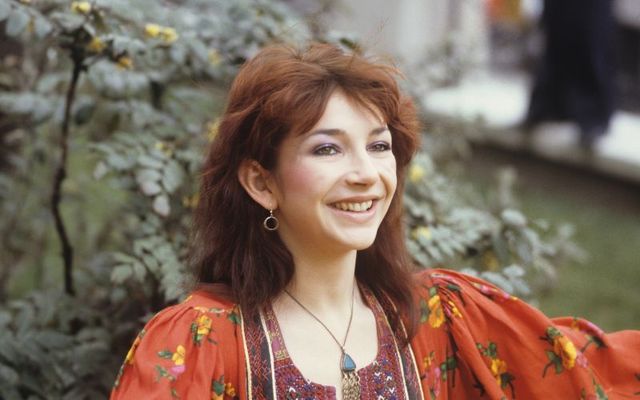Kate Bush, who currently tops the Irish and UK charts with her 80s hit "Running Up That Hill", has deep Irish connections on her mother's side.
Bush has rocketed to the top of the charts for the first time since 1978 thanks to the resounding success of Running Up That Hill following the release of the fourth season of the hugely popular Netflix "Stranger Things".
Although very clear that she is an English artist, Bush has always been proud of her Irish heritage.
Her mother Hannah Daly grew up in a deeply musical family on a farm outside Dungarvan, County Waterford and Bush said that her Irish heritage helped to shape her both as a person and as a musician.
Bush's sole performance in Ireland came shortly after the release of her debut single "Wuthering Heights" in 1978, which remained her only number one single until recently.
Bush performed the song on Ireland's Late Late Show and talked to presenter Gay Byrne about her Irish roots after the performance, although the 19-year-old singer refused to reveal her mother's maiden name in a bid to shelter her family from her newfound fame.
Irish music and culture have had a profound impact on Bush's career ever since her breakthrough in 1978.
"The Dreaming", her fourth studio album, is conspicuous for the significant number of traditional Irish musicians featured in the song "Night of the Swallow".
Bill Whelan, who would go on to achieve fame as the composer of Riverdance, features on the track on bagpipes, while the Chieftain's Sean Keane played the fiddle. Planxty members Liam O'Flynn and Dónal Lunny also featured on the track, playing the uilleann pipes and bouzouki respectively.
Bush also sang in an Irish accent for the Dreaming's third single "Army Dreamer".
Bush would recruit more Irish artists for her most iconic album "Hounds of Love", which topped the UK Album Charts in 1985.
Lunny was again involved, as were the Dubliners' John Sheehan and Paddy Glackin of the Bothy Band.
The trio featured on "The Jig of Life", a conceptual piece that centers around a woman drowning at sea part-recorded at Dublin's Windmill Lane studio.
"She gave me a big hug and said, ‘oh, you’re playing so emotionally," Sheehan told the Irish Examiner in 2020. "She was fastidious about getting things right. I remember playing the [tin] whistle. She was saying ‘this is absolutely beautiful but when you get to this note can you just slide up," he continued, adding that Bush was a real perfectionist.
Bush was also influenced by Irish writer James Joyce and planned to include a quote from Ulysses for the title track of her 1989 album "The Sensual World".
However, Joyce's estate refused to grant permission to allow Bush to quote directly from the famous work.
Read more
In 1996, Bush sang in the Irish language for Lunny’s 1996 anthology Common Ground – Voices of Modern Irish Music.
The English singer sang "Mná na hÉireann, an Irish rebel song based on an 18th-century poem set to Seán Ó Riada's "Beautiful Air".
"She was very excited with the idea of singing the Irish in a way that Irish speakers would understand, and of conveying the meaning of the song through the sounds of the words," Lunny said.
"I helped as much as I could. She had Seán Ó Sé’s recording of Mná na hÉireann as reference. She was as faithful to the pronunciations as she could possibly be. It was with characteristic care and attention that she approached it. She did not stint one bit.




Comments